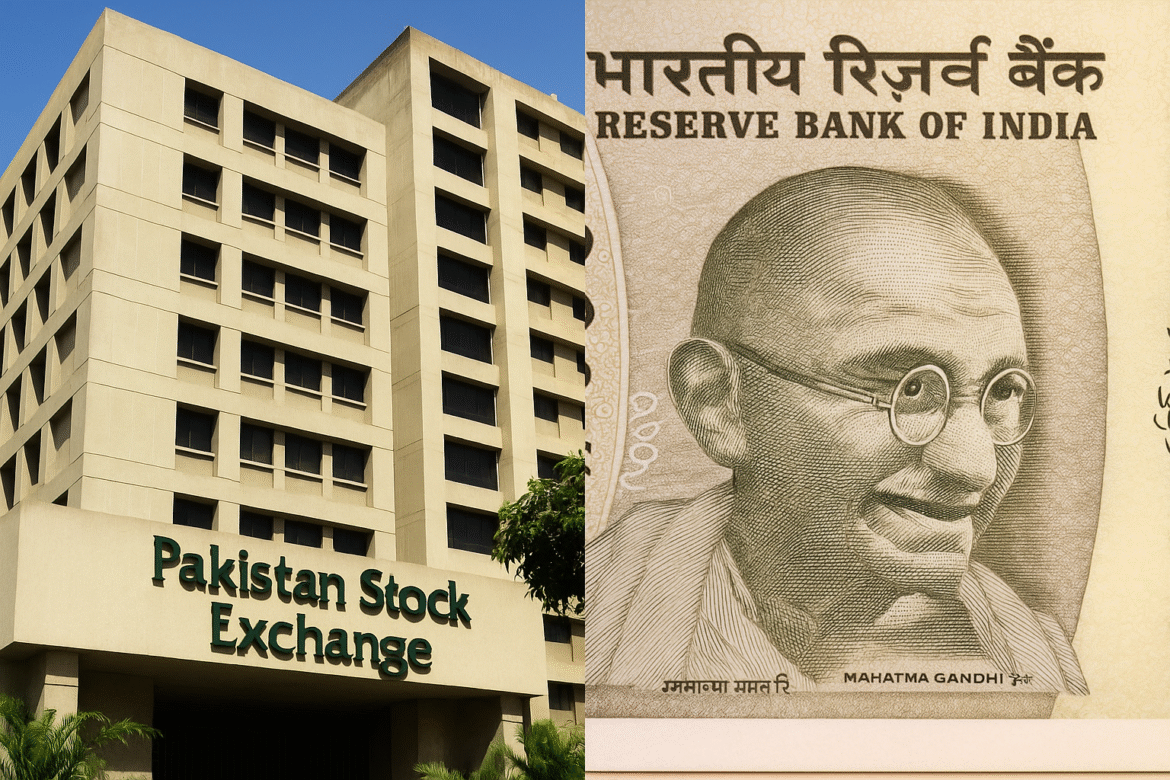By Staff Reporter
KARACHI: Stocks suffered its worst day on record on Thursday, as the market tumbled 6,482.21 points on Thursday, marking its largest single-day decline in terms of points, as escalating military tensions with India triggered a wave of selling that wiped nearly 5.89 percent off the benchmark KSE-100 Index, closing it at 103,526.81.
The rout began early, with the index plunging nearly 7,000 points, prompting the Pakistan Stock Exchange to suspend trading for an hour.
When the market reopened, the sell-off resumed, driving the index to an intra-day low of 101,598.90 after shedding an additional 1,400 points. The decline followed a volatile Wednesday session, where the KSE-100 partially recovered but still ended down over 3,500 points at 110,009.02.
“Selling was across the board, with key sectors including automobile assemblers, cement, commercial banks, fertilizer, oil and gas exploration companies, OMCs, power generation, and refinery all under pressure,” said Sana Tawfik, Head of Research at Arif Habib Limited. “If tensions escalate further, then selling pressure will persist until clarity is achieved.”
Index-heavy stocks such as Hub Power Co., Attock Refinery Ltd., Mari Petroleum Co., Oil & Gas Development Co., Pakistan Oilfields Ltd., Pakistan State Oil Co., Sui Southern Gas Co., National Bank of Pakistan, and United Bank Ltd. all closed in the red.
The market’s collapse was driven by a sharp escalation in hostilities between Pakistan and India, nuclear-armed neighbors with a decades-long rivalry. The crisis intensified overnight when Pakistan’s military shot down Indian drones. “India last night took yet another blatant military act of aggression against Pakistan by sending Herap drones at multiple locations,” said Lt Gen Ahmed Sharif Chaudhry, Director General of Inter-Services Public Relations, in a Thursday press conference.
Fighting along the Kashmir frontier has erupted into the heaviest clashes in over two decades, with shelling and gunfire reported across the border. Pakistani officials said 31 citizens were killed in Indian missile attacks inside Pakistan, while the military downed five Indian Air Force jets — including three Rafale, one MiG-21, and one SU-30—in retaliation.
Pakistan also reported shooting down 31 Indian drones. India countered that it had neutralized Pakistani attempts to target military installations in its northern and western regions on Wednesday and early Thursday, and said it had struck “terrorist infrastructure” in Pakistan following an attack in occupied Kashmir that killed 26 people two weeks earlier — an accusation Pakistan denies.
The turmoil reverberated across the border, battering Indian markets. The Indian rupee slumped 1 percent to 85.71 against the US dollar, its steepest drop since February 2023, after hitting a session low of 85.7625. Benchmark equity indexes, the BSE Sensex and Nifty 50, fell 0.5% and 0.6%, respectively, while the yield on India’s 10-year government bond climbed nearly 7 basis points to 6.3983%.
Market analysts see more turbulence ahead. “The rupee could continue to face pressure and may fall towards 86.50,” said Abhilash Koikkara, head of forex and rates at Nuvama Professional Clients Group, pointing to potential panic dollar buying by importers as a key risk.
Dollar-rupee forward premiums surged, with the one-year implied yield jumping 16 basis points to a near one-month high of 2.34%, and the rupee’s one-month implied volatility hit a two-year peak of 6.3%.
“International investors undoubtedly evaluate geopolitical risk into their assessment of India, contributing to the rupee’s underperformance,” said Samsara Wang, an Asian sovereign analyst at PineBridge Investments.
The deepening conflict, she added, is amplifying pressure on Indian assets as global markets weigh the fallout from the standoff between the two South Asian powers.
Copyright © 2021 Independent Pakistan | All rights reserved




